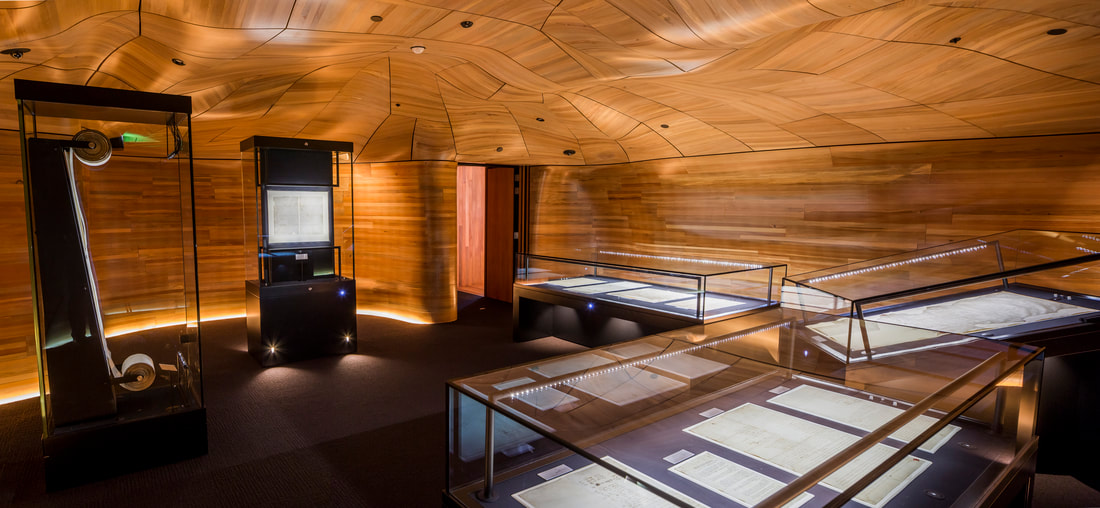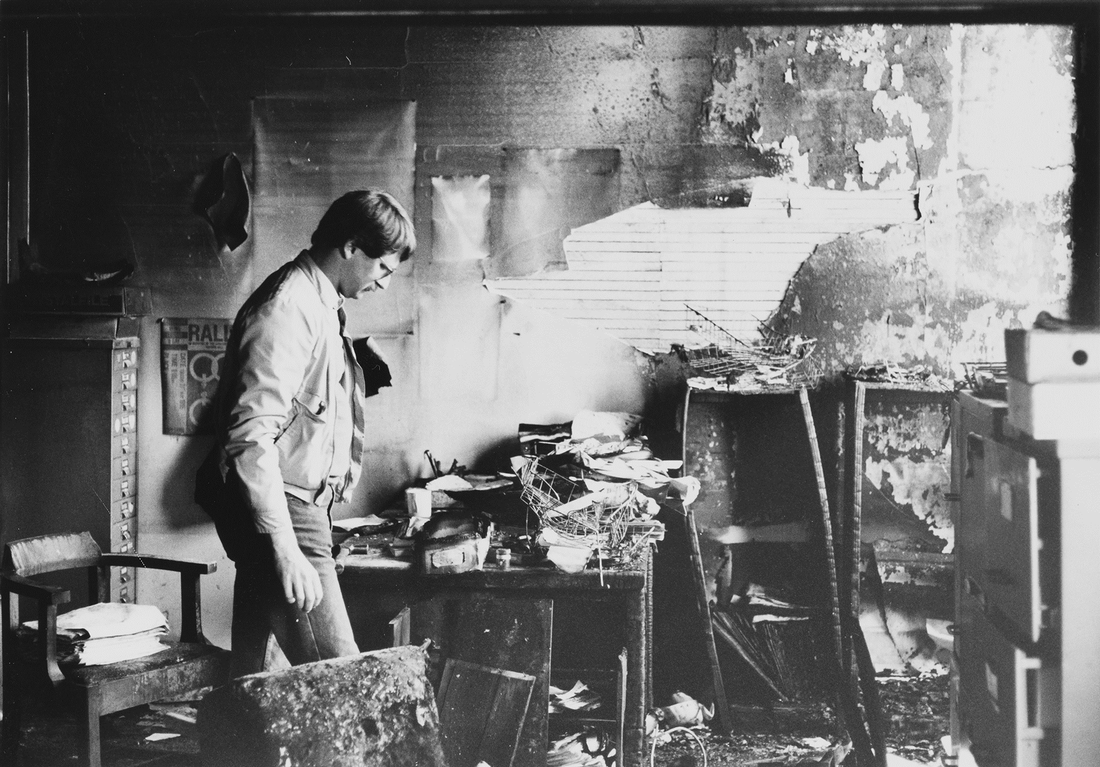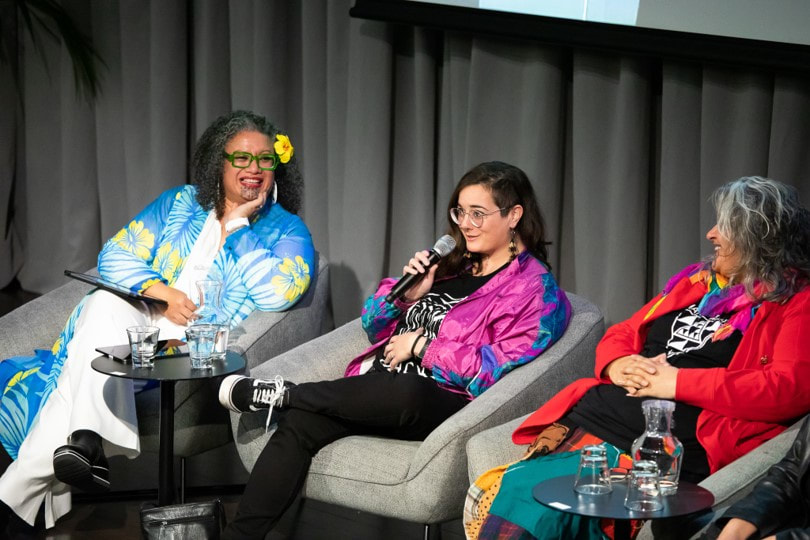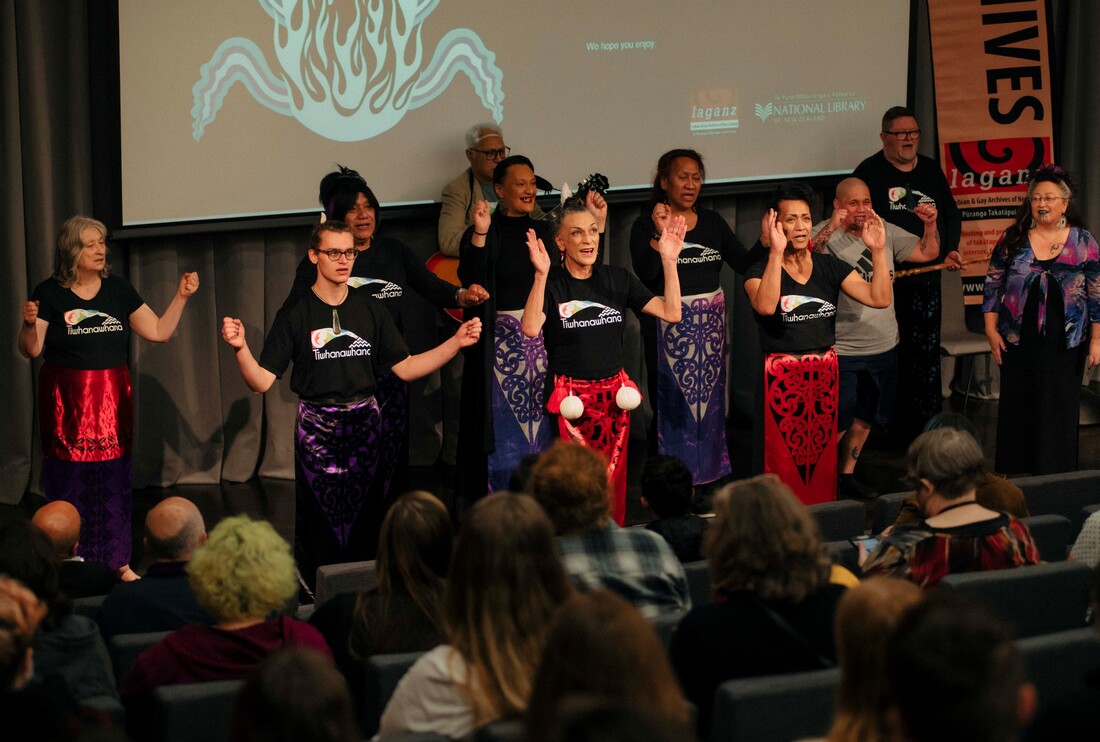I am a project coordinator for the public engagement team at the National Library of New Zealand Te Puna Mātauranga o Aotearoa. I also volunteer as a project coordinator for the Lesbian and Gay Archives of New Zealand Te Pūranga Takatāpui o Aotearoa (LAGANZ), which has recently transitioned into Kawe Mahara Queer Archives Aotearoa. Kawe Mahara means to carry the memories of our queer tūpuna and mokopuna of the past, present and future. It is a community archive in the Alexander Turnbull Library of Te Puna Mātauranga o Aotearoa.
At the National Library in Wellington, the exhibition He Tohu stands as an example of archival justice and a mandate for archival justice. It contains the 1835 He Whakaputanga, the nine sheets of the 1840 Te Tiriti o Waitangi and the Treaty of Waitangi, and the 1893 Women’s Suffrage Petition. These taonga have been saved from erasure to share their mātauranga with generations to come. The Waitangi sheet of Te Tiriti o Waitangi faces Parliament to hold the Government of the day accountable to its principles. This exhibition and the whakatauāki He whakapapa kōrero, he whenua kura guide the mahi and public programming of Te Puna Mātauranga o Aotearoa and the work we have done and continue to do with our rainbow communities.

Kawe Mahara’s history since 1977 has been one of activism and community-building, collecting and disseminating resources, stories, histories and queer cultures among silences, to save lives from the silences of criminalisation and HIV and AIDS stigmatisation. Kawe Mahara gave life to and preserved the movement of Homosexual Law Reform, and the decriminalisation Act was finally passed almost a century later, in 1986.
Two months after the Homosexual Law Reform Act passed in 1986, two men tried to burn down the centre with cleaning fluid and issues of Australia’s queer magazine Campaign.
In an eerie echo of history, in 2022 two men burnt down RainbowYOUTH and Gender Dynamix’s drop-in centre in Tauranga. The harm of silence lives on as one of many threads of whakapapa that can bind us. It’s why we create memory archives, and it’s why we keep those archives alive.
The problems of legislative timelines and legislative-based collections, indeed the challenges within a whare like Kawe Mahara Queer Archives Aotearoa, are the loud silences of archival violence.
This is not to say that work isn’t being done to address these silences. The Contemporary Voices and Archives (CVA) was established in 2021 at the Alexander Turnbull Library. CVA envisions contemporary collecting as an approach to preserving cultural heritage and a form of socially aware heritage practice if not activism. CVA practices collecting as a way of learning, of making meaning, by building collections believing in their power to act as agents of social change, focusing on marginalised and under-represented cultural identities, communities, events, concerns, and formats.
My work with the National Library’s Public Engagement team has allowed me to explore the questions: how can public programming work with and against archival silence? Even going beyond that, how can public programming do justice to archival silences?
Saidiya Hartman suggests one way of confronting archival violence – “writing history with and against the archive”. But this practice can be extended to oral history, strengthening whakapapa and creating new taonga – taonga kōrero.
Takatāpui has always been about the collective, it’s about bigger than just us as individuals, it goes beyond space and time, it stretches into the past, into the present, but also into the future as well because I think we often don’t talk about how takatāpui also form our own whakapapa and our own whānau and our own families. So yeah, I’m proud to have received this tradition, this kōrero, that was never offered, it was reclaimed, it was taken, it was held on to, it was resisted.
Intergenerational stories are the taonga, often in the absence and because of the absence of physical taonga. Stories are the bridges across institutional divides and bureaucracies, across the silences of collections, across the silences in education.
The need from our institutions is clear: let our communities in, and they will create the taonga. Our communities strengthen the neural pathways of history, and create new ones where needed.
If you would like to get involved with carrying Aotearoa’s queer memories and histories, contact us at [email protected].
Reuben Love (he/they) (Pākehā) is a kairuruku kaupapa with Te Pūranga Takatāpui o Aotearoa and a kairuruku kaupapa with Te Puna Mātauranga o Aotearoa. They are excited by the potentials of weaving stronger queer connections between communities and institutions.





 RSS Feed
RSS Feed